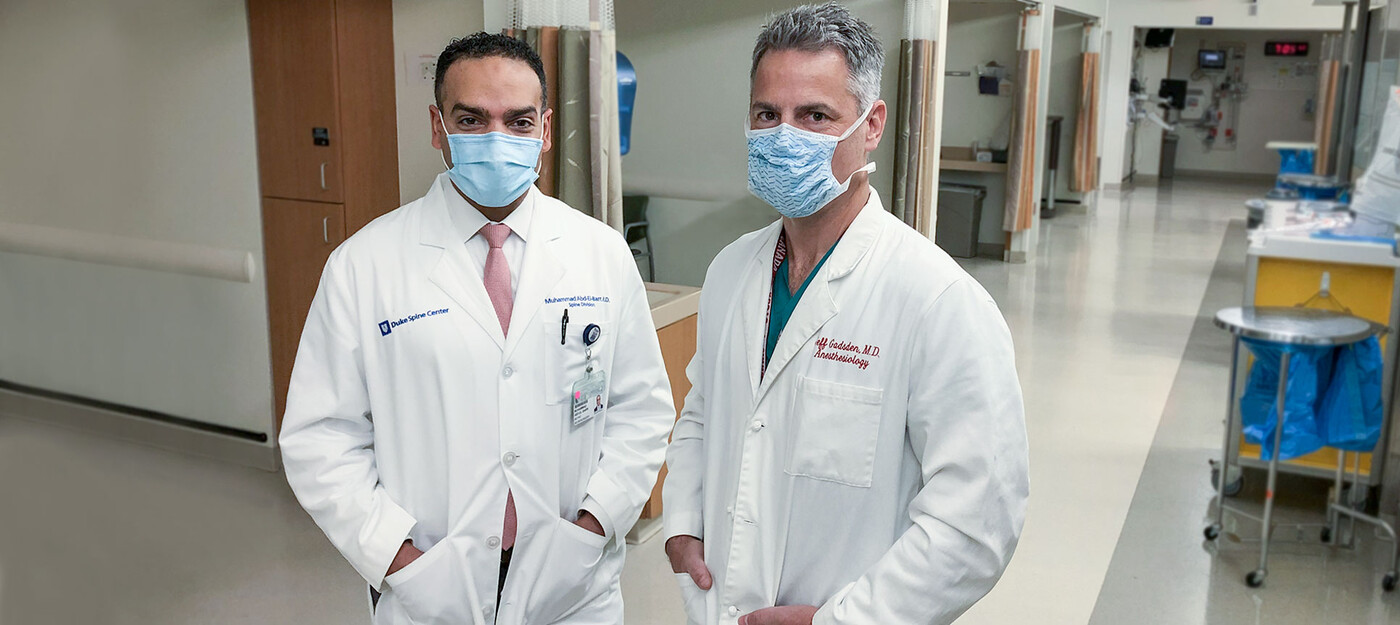Stay Awake During Spine Surgery to Recuperate Faster, Go Home Sooner

Duke neurosurgeon Muhammad Abd-El-Barr, MD, and anesthesiologist Jeff Gadsden, MD, combine surgical techniques and anesthetic advances to offer awake spinal surgery.
Awake spine surgery is an alternative for people who can’t tolerate or don’t want general anesthesia. With perks that include a shorter hospital stay and an easier recovery, awake spine surgery means more people can get the spine surgery they need.
The Right Combination
General anesthesia puts a person in a sleep-like state, and it comes with risks and side effects that can make it unappealing. It usually requires a person to stay overnight in the hospital after surgery because general anesthesia takes at least 24 hours to completely leave your system. However, advances in regional and local anesthetics have made it possible to perform “awake surgery” (which is already commonly used for brain surgery and other procedures) without general anesthesia. As a result, you remain conscious and alert during the procedure but cannot feel pain.
Duke neurosurgeon Muhammad Abd-El-Barr, MD, offers awake spine surgery by combining new surgical techniques with anesthetic advances. He uses minimally invasive surgery methods to access the spine with less movement of muscles, nerves, and other tissues. And he partners with Duke anesthesiologist Jeff Gadsden, MD, who uses regional spinal anesthesia to numb the patient from the neck down, plus a special nerve block to stop pain signals coming from the spine.
“We knew we could do minimally invasive surgery safely and efficiently,” said Abd-El-Barr. “We had to work closely with our anesthesiology colleagues to make sure we could do it with the patient awake. The close collaboration we have with anesthesiology is critical for the success of these cases.”
Of course, not everyone wants to be awake during spine surgery. But Dr. Abd-El-Barr believes more people will opt for awake spine surgery when they learn the benefits include a faster recovery, fewer postoperative complications, and less time spent in the hospital.
Hear from a patient who underwent awake spine surgery.
Awake Spine Surgery at Duke
Dr. Abd-El-Barr performed the first awake spinal fusion surgery at Duke in late 2019 on a man who had reacted badly to general anesthesia in the past. This time around, he was able to go home less than 24 hours after the surgery.
“He had been in horrible pain before the surgery and had to be brought in by wheelchair,” said Abd-El-Barr, “and then he walked out of the PACU [post-anesthesia care unit], without ever spending time on a hospital floor.”
Virginia resident Janie Colvin, 63 years old, didn’t have a medical reason for avoiding general anesthesia. She just wasn’t comfortable with it.
“I did not want to be put to sleep,” Colvin said. “The thought of it just weirded me out.” So she opted for awake surgery and left the hospital just four hours later.
Because this type of surgery is uncommon -- only a handful of surgeons offer it in the U.S. -- Dr. Abd-El-Barr stays connected with his peers to share best practices and improve techniques.





